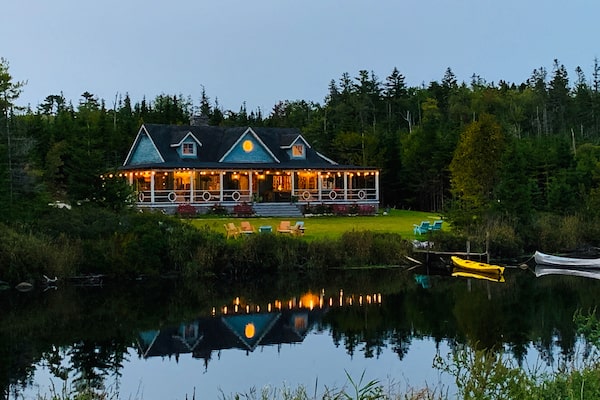
The set of Moonshine on Nova Scotia's south shore, where a TV show about a dysfunctional family's resort would bring my life and art together in strange ways.Main photo: Scott Smith • Additional photography courtesy of Sheri Elwood
Sheri Elwood is a screenwriter, director and showrunner. The first season of her TV series Moonshine can be streamed on CBC Gem and Netflix on May 2. The second season will be released later this year.
The morning I decided to radically simplify my life, the regular security guard was out sick.
I pulled up to the gated entrance of Warner Bros., the studio where I was working as a writer-producer for the TV show Lucifer, expecting to be waved through as usual. But the new guy didn’t recognize me. He insisted he see a photo ID. A driver’s licence.
My secret shame.
I’d lived in Los Angeles for more than a decade, but was too scared to attempt the California road test. There are a few things I’m good at: roasting a chicken. Choosing the playlist. Sloth. Things I’m bad at: parallel parking – a trait inherited by my teenage daughter, who aced every school test yet crashed our car so many times, she once even blamed a tree she’d downed.
The guard waited. The jerk in the Tesla behind me honked. Fine. I fished out my old licence.
The guard examined it: Nova Scotia? Where was this exotic place? As far from L.A. as you could get without falling in the glacial North Atlantic. Did I have family there? Yes. Mom’s got a love-hate thing with her new hip. Stepdad spent the kitchen reno money on a backhoe. And the dogwoods are in bloom. Big, pink flowers. I planted them 15 years ago, but always miss spring. I paused. “Summer too.”
The guard nodded. Recognition, tinged with sadness. That’s when I noticed the hint of an accent. “We’re all a little far from home, huh?” He handed back my ID and opened the gate.
Moments later, I pulled in to my parking spot alongside our writers’ bungalow, my name stencilled in black on a cracked concrete curb, a weird perk of having “made it” in Hollywood.
Then I turned off my ignition and burst into tears.
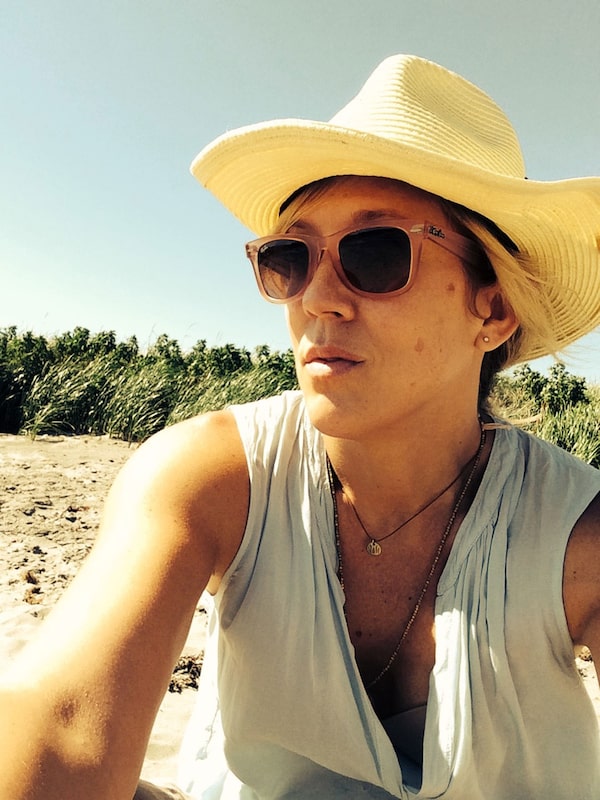
Me on my parents' property.
The urge to flee the big city in search of a simpler life is a relatively modern conceit. In my circle, the feeling starts to creep in around the fortysomething mark – an itching desire to return to the cozy idyll of the place we’d grown up, or, even better, finding an entirely new place, the place we wished we’d grown up. I knew dozens of burnt-out city dwellers considering this reverse migration, or, as I liked to call it, GTFOOD: Getting The F Out Of Dodge.
It was the classic Hallmark fantasy; ditching the high-pressure career, deprogramming our city kids and reconnecting with THINGS THAT MATTER, including, but not limited to: an adorable pet goat/pig/rooster named after a Criterion Collection film character, elderly neighbours with homespun-albeit-often-outdated advice, a charming fixer-upper you magically knew how to renovate, and acres of fertile land purchased for the price of an L.A. chaise.
You’d reconnect with family, even if you didn’t have family, because small towns welcome strangers with open arms. And butter tarts. There’s always butter tarts. The food varies, depending on the season; rhubarb pie, fresh steamed lobster, poutine, oysters plucked from Sober Island – you get the gist.
Prepandemic, few actually indulged the fantasy, my husband and I included. We were tethered to our careers, an unwieldy house, four kids, two dogs, turtles predicted to grow to the size of large dinner plates, and a nanny, Griselda, long outgrown but who still showed up for work every day. We couldn’t just bail. Who would monitor the leaky pool no one swam in?
The answer came when a producer, Charles Bishop, asked if I had any interest in creating a show set in Nova Scotia. “Something about a family, maybe there’s music?” I took it as a sign. Yes, I had an idea. A story about an urban career woman who inherits half of her family’s failing campground.
So, the actual plot of a Hallmark movie? Not quite.
My show would deal with family dysfunction, long-buried trauma, addiction, sexual repression, poverty, infidelity, tax evasion, drug smuggling and crazed sibling rivalry. But funny! I pledged to pull all the skeletons out of the closet, or, in my case, dig them up from the front lawn.
Specifically, I wanted to dramatize the relationship of three sisters pushing 40, who most definitely did not have their shit figured out, livestock they’d named or happy endings with high-school sweethearts who now ran the local bakery/organic farm/diner.
Moonshine, a raucous tale of lust, legacy and lobster, would be inspired by my own family who ran a ramshackle summer resort and campground in Hubbards, a small coastal town on the south shore of Nova Scotia. The idea checked no boxes, served no political agenda, but it felt timely and true. It was the show for anyone who’d ever longed to return home in search of a simpler life, then made the insane decision to follow through. Low stakes, Big Drama.
And yes, there would be music. Moonshine would play out against a backdrop of classic rock, because everyone knows that small-town radio has the same 20 songs on rotation – anthems burned into our national psyche. Even if women-of-a-certain-age stories weren’t your thing, you’d watch my show and yearn to rock an old-school spliff with Joni and April Wine, goddamnit.
Charles was intrigued, but wondered about the autobiographical nature of the show: “Won’t your family mind?” I paused, oblivious to my own obliviousness. “Why would they mind? They’ll be thrilled.”
We sold it to CBC the following week.
:format(webp)/cloudfront-us-east-1.images.arcpublishing.com/tgam/5MZYXBCA3RAS5E4DAJ5Q6VLQEE.jpg)
:format(webp)/cloudfront-us-east-1.images.arcpublishing.com/tgam/MZGYXPWWYNGNTLEKMZN6BIBQLA.jpg)
:format(webp)/cloudfront-us-east-1.images.arcpublishing.com/tgam/TZ4KUF2HI5BFRHMX2432XR6UKU.jpg)
While Moonshine was green-lit for production in late 2019, no one anticipated what was about to befall the world. We went to camera in the summer of 2020, pandemic pioneers, one of the first shows in the country to mask up and roll the contagion dice.
Even so, I wasn’t worried about travelling back to Canada, or the idea of returning to the workplace, because nothing was scarier than L.A. at the time. No amount of sunshine or round of afternoon Negronis could paper over the growing homeless encampments, protests, the threat of Donald Trump being re-elected and the Fear. Everyone in Hollywood was losing their minds.
In contrast, Nova Scotia, with its strict rules, was virtually COVID-free – a utopian beacon of sanity. While my husband is American, I held the golden ticket, a Canadian passport. It was our way out, and we were taking it.
After we sold our L.A. home to a well-known actor-director, who loved our easy access to the freeway in case the zombies rolled in, we packed our belongings, put a sight-unseen offer on a renovated church hall in the UNESCO World Heritage town of Lunenburg, and waved goodbye.
It would be amazing, I promised our youngest son, 16. He’d gone to summer camp in Nova Scotia. Now he’d get to experience that feeling year-round. “Ticks, bad food and pink eye?” Charlie wasn’t sold. “It’s not forever, right? Please tell me we’re going back to L.A. after COVID?”
I assured him the world would right itself eventually, then we’d see what’s what.
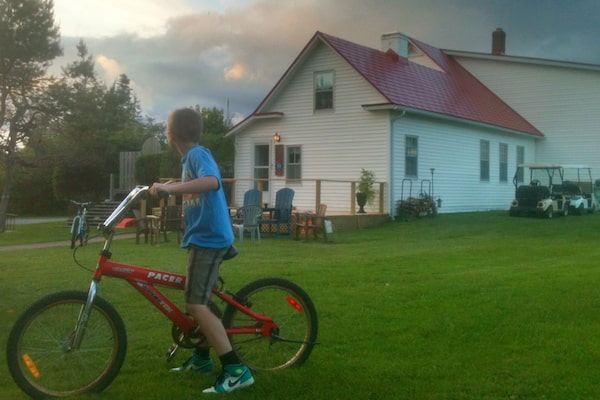
My parents' property in Hubbards was close enough to set that Mom could watch the goings-on from her porch.
Traditionally, the Maritimes have been a place people moved away from in search of greener pastures, but for the first time in its history, the greener pastures now had an ocean view. In 2021, Nova Scotia marked its largest population boom since the 1970s, the modestly sized province topping more than one million people.
Business is booming, and not everyone is happy about it. Housing prices have skyrocketed, which means some locals can’t afford to rent in their own towns, let alone buy. Tradespeople are few and far between because of the uptick of new builds. Even rental cars are in short supply – wannabe residents scouting for their new lives. Would we be welcomed back? Or was this a chase-the-newbies-with-torches situation?
While technically I was considered a “local,” I suspected my return might be deeply annoying, because it’s one thing to go home, quite another to go home with a huge fleet of trucks and trailers and a cast and crew of 120 in tow.
Maybe I’d be given a pass? Hell, I was hiring local and bringing a certain notoriety to the town. They should be thanking us, right? Charles, the producer, was still worried about my folks.
Mellow by nature, Mom took it all in stride. She claimed to enjoy monitoring the action from her front porch, because she knew how bossy I could get and didn’t want my crew to revolt.
Then she reminded me about a prep meeting I was late for in the lunch tent. Of course, she’d asked to be put on call-sheet distribution and had my line producer on speed dial.
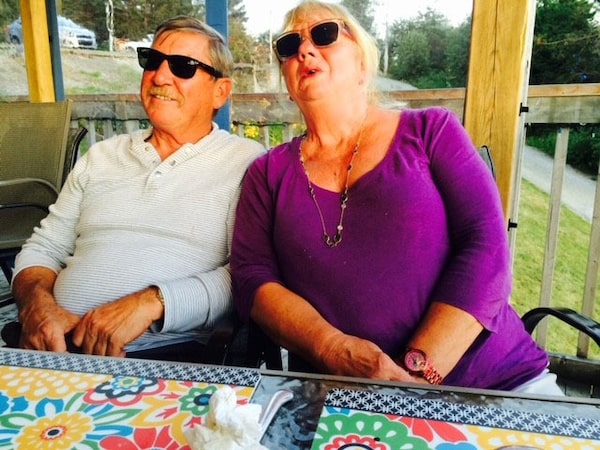
My mother and stepfather.
Initially, this clash of the personal and professional worked. I rode the bike I’d abandoned years ago from set to set, weighing in on decisions ranging from tenor of a joke to the colour of the David Crosby-inspired beanie our fictional patriarch, Peter MacNeill, wore.
And while we writers had no parking with our names on curbs – or any real perks for that matter – we did score a cabin near the beach. A typical day: writing. Swim at lunch. Revisions in the sun. My colleague Moira would force-feed me a butter tart, then I’d stop to check in on Mom to remind her to lay off the smokes and work on the hip. She’d smile politely. Then tell me to piss off.
The dream was manifest. If only I could find a decent place to sleep.
Our “charming fixer-upper” in Lunenburg turned out to be a huge empty space with rows of merciless church windows. It was freezing on cold days, a sweltering terrarium in the sun. The downstairs, gussied up just enough to be deemed “residential,” had poured concrete floors only a fascist could love and no usable outdoor space.
The former owners also turned out to be giants. Countertops, shelving, even the built-in bed had been designed for 6½-foot-tall aliens. We couldn’t reach the mugs. Vertically challenged writers without caffeine is an ugly, ugly thing.
This was a months-long reno at best (we’re currently on Year 2), which meant we couldn’t unpack our eighteen-wheeler’s worth of belongings. Think the warehouse from the last scene of Raiders of the Lost Ark. Rows and rows of identical brown boxes, lovingly organized by our nanny, Griselda. Most labels didn’t list the contents; instead, there were sad faces, drawn in Sharpie, saying “I miss you” and “come home” in Spanish. Cute, but not so helpful, especially for a teenager searching for his vintage Air Jordans.
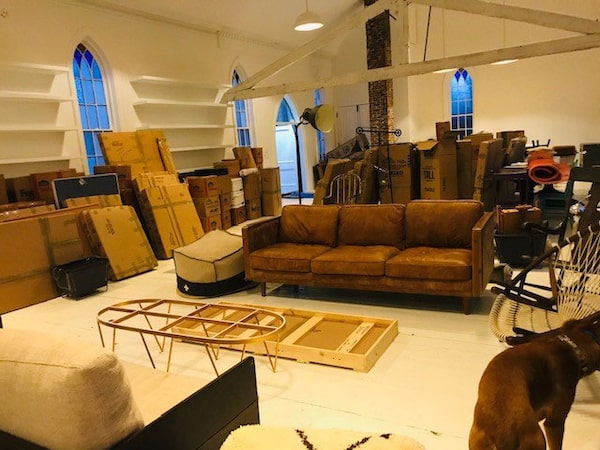
Boxes, furniture and more boxes at our 'charming fixer-upper' in Lunenburg.
In the interim, I asked my mom if we could crash on the campground near set. Sure, she said, but it was busy season – possibly their busiest ever. Nova Scotians who weren’t allowed to vacation outside of the province had been coming in droves. Between my crew and tourists from Truro, the dreaded Cabin 3 was all that was available.
When my mother didn’t like the sound of a guest making a booking on the phone (she didn’t believe in online) she’d stick them in Cabin 3. When a band came to play the Shore Club and required accommodations, the toothless roadie got Cabin 3. Cabin 3 was code for roughing it. A quiet fuck you from the owners.
The stove was a barely functioning hot plate. The shower worked fine if you didn’t mind rusty water. Rustic chic extended to the vintage mattress where, judging from the smell, I’m pretty sure the roadie had just taken a nap.
My siblings thought this was hilarious. L.A. Sheri in Cabin 3? “Mom must be pissed.” I assured them she wasn’t and that L.A. Sheri was no more. This was new, back-to-basics Sheri. If I could handle flying coach with two dogs, I could handle Cabin 3. They reminded me that my husband flew with the dogs. I flew business.
No matter. It was cheap, which meant I could afford that Fleetwood Mac song for Moonshine’s soundtrack. And, bonus, I had a view of the main house, so I could monitor Mom’s habits – and she mine. Rolling in after a night shoot. Trolling for cell signal. Hiding from Judy, the local historian, who was desperate to include me and my spectacle in the Hubbards historical records.
I was the story of a local girl who made good and Judy wanted the dirt. Sure, the characters on Moonshine were fictional, but which of my real siblings did I base the alcoholic brother on? Had Nora really slept with the entire volunteer fire department? More pressing, that scene where the lead, Lidia, runs over a tourist with a golf cart? Judy was there when that actually happened, years earlier. Were those charges ever dropped?
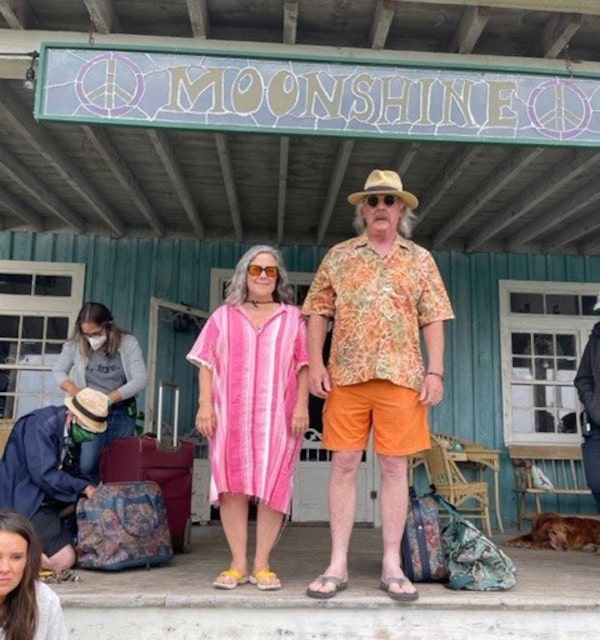
Corrine Koslo, shown with Peter MacNeill on set, plays the mother on Moonshine.
It’s one thing writing about your life. Quite another when you return to the scene of the crime to see it realized on TV. The meta nature of Moonshine could no longer be ignored as siblings, cousins and parents visited set, only to be met by their fictional counterparts.
Corrine Koslo, who plays the mother, Bea, on the show, even started shopping at my mom’s favourite dress shop and, in turn, my mother ordered Corrine her favourite lipstick so they could match. Yeah, it was weird. And it was my own damn fault.
I’d been directing a scene about our fictional radio station, COVE-FM, set at the real radio station, also named COVE-FM, when I was approached by the town bookkeeper who kept an office next door. She gushed. Moonshine had given a much-needed boost to the local economy, and everyone was so grateful. She couldn’t wait to see the show. “Your mother is so proud.” “And resilient,” cracked my ex-husband, our production designer, Bill Fleming. Resilient? What the hell did that mean?
Tired of being damp and dirty in Cabin 3, I hightailed my giant rental Jeep to my mom’s parking spot and hauled dirty laundry to her door. It was locked. Impossible. Mom went out without telling me? Even the hidden key was gone.
Were my siblings right? Was Mom pissed? Sure, I’d spent more than a few nights in my sister’s childhood bedroom. I was sick of set catering, so was raiding their fridge on the daily. Our teenagers had taken up residence in Grandma and Grandpa’s den, and yeah, my crew was stopping by on the nightly for a bevy. My parents’ deck had become the hottest club in town and no one paid their tab.
Certain locals were also getting sick of us: We drove too fast up Shore Road. We depleted the liquor and organic-food aisles at the local grocery store. Night filming was loud, disruptive and shone lights into the campground. And old Hilda Duncan was on the warpath because we’d blocked her path to the beach with our art-directed trailer park. But my own mother locking me out? This was next-level.

A sign at our trailer park marks the distance back to Laurel Canyon in California. We had come a long way to be here, in more ways than one.
Children leave the nest because that is what mammals are designed to do. It’s healthy and natural. So, if and when we make the decision to come back home, we need to be okay if said nest is different. Smaller – if the nest is still there at all. Because that’s nature too. Parents miss us, but the truth is, they don’t want us gentrifying their coffee shops, crashing in their den or naming their goats.
My family was okay with me making a show inspired by them. They were proud. What they weren’t okay with was me monitoring the life they’d built in my absence. If the old hippies felt like sneaking a butt or getting loco in the hot tub, they wanted to do it in peace.
Production on Season 1 eventually wrapped – the last episodes had us filming a hot summer beach scene as an early snow flew and my gifted lead, Jennifer Finnigan, pretended to sweat. The 80-some-odd trailers and trucks moved on, restoring my mom’s view, and our cast and crew flew back to L.A., Ontario and B.C.
As for us reverse migrants, I moved out of Cabin 3 and back into my sort-of-renovated behemoth in Lunenburg. My husband and I finally opened boxes, piling dishes into drawers and shelves we could now reach, and I had a moment to consider the gravity of what I’d done. Because transplanting your entire family to scratch that Hallmark itch had a dark side for the rest of the family, too.
Charlie was struggling at the local high school, unable to be the hero of his own story when he walked amongst “non-playable characters” – gamer speak for kids who didn’t know what to do with my arty L.A. teen. Masked, shy and oh-so-different than his small-town Canadian counterparts, he hadn’t made a single friend, and our other three college-age children were separated by a COVID-ravaged border.
And as for my work-life balance? The “radical simplification”? Making a TV show is all-consuming and I hadn’t had a day off since we’d arrived. I never did get to visit the local farmers market and the days I was able to enjoy my dogwoods in bloom were few and far between. In trying to forcefully impose the warped Hallmark fantasy, both real and fictional, I’d created a much bigger problem. Yes, I was back home, but my big-city burdens had moved back with me. Great fodder for Moonshine, bad fodder for life.

Making Moonshine didn't leave a lot of time to enjoy the small-town life I'd come to savour.
My mom called, worried. She’d found a single boot in Cabin 3 and was concerned I was barefoot. Did we want to come for supper? SWEETJESUSYES. We were starving because our new oven arrived broken beyond repair. For the second time.
Now that filming was over, it was quiet again in Hubbards, a sunny day in October. We sat on my parents’ porch and ate. Glorious chowder.
We laughed that Judy never did get the full story, and we admired the towering, ancestral pot plants my stepfather cultivated and strategized how to move them inside, mid-squall.
Then, we screened the first episode of Moonshine.
It wasn’t the dysfunction, the language or the tangled emotional dynamics that my parents recognized. Much to Charles’s relief, they never assumed the show was “about” them, as people rarely see themselves as their loved ones do.
What struck my parents, glued them to the screen, were the shots of their beloved small town. They clapped and gasped at every drone shot of the coastline, the white sand beach, our fictional band rocking out at the Shore Club.
“Look at where we live! Now the world will get to see it too.”
They were bursting with pride. For their home. And for me.
It was that moment, tumbler of boxed wine in hand, surrounded by the OG Moonshiners, that I realized why I’d come back home and what the show was really about: what Hollywood execs call the “why now” of this tale.
Moonshine isn’t a show about the quest for a simpler life, because simple is bullshit. It does not exist. Life is messy, heartbreaking and unpredictable.
You can try to run from the complexity, but it’s impossible to hide – especially in a town where everyone knows that the woman who ran over the tourist with the golf cart was you.
The reason I’d cried that day on the studio lot wasn’t because I hated my life in L.A. or because I craved simplicity. I cried because I was missing an important piece of the life puzzle. Family. Making time, real time, for the people who mattered. The people who called me on my bullshit. The mother who cared if I was hungry and barefoot.
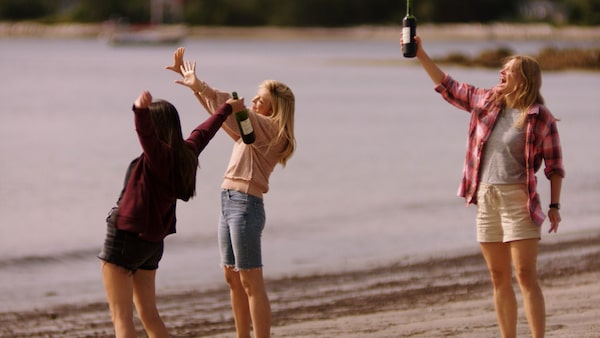
Emma Hunter, Jennifer Finnigan and Anastasia Phillips portray the feuding sisters at the heart of Moonshine.
Several months and a second season later, I was back in L.A., settling a much-happier Charlie into his senior year of high school, when I got the call. Mom had fallen over and couldn’t get up. This time, it wasn’t a hip issue, or too much gin. An emergency MRI had revealed rapidly spreading lesions on her brain stem. A rare form of cancer.
The whole clan came home. Me and my non-fictional siblings sat at Mom’s bedside, thanking her for our lives, telling her that we loved her and, most of the time, each other.
I called everyone I’d ever known, and everyone they’d ever known, to track down a neurosurgeon who might give us hope. Making a TV show during a pandemic is child’s play compared with navigating Nova Scotia’s health care system.
To no avail. Five weeks later, my funny, proud, hot-tub-loving mother was dead.
While my grief is incalculable, I worry my siblings’ suffering may be worse. Like most children who leave the nest, they’d been away from home for many years – the complications of COVID-19, young children and busy careers. I was the only idiot naive enough to upend my life and move back to a small town that didn’t want me, yet was kind enough to welcome me back … along with the circus I’d dragged along for the ride.
Was it fate? Opportunity? Had I sensed the fragility of time as the world was on the verge of falling apart? My children and I were lucky enough to have seen my mother every day for two years, whether she wanted to see us or not. She’d remind me of this as she pulled us in for a hug.
It’s this loving, spiky spirit, this real-life messiness that infuses Moonshine, and, as I continue to grieve, keeps me upright still.
Can you ever really go home again? No.
Go anyway.
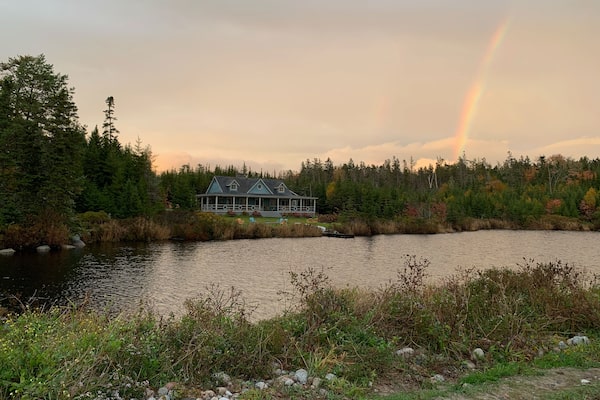
Moonshine is available for streaming May 2 on CBC Gem and Netflix.